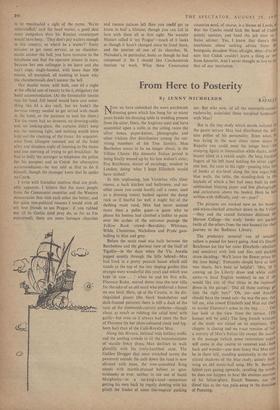From Here to Posterity
By JENNY NICHOLSON LO
RAPAL
Now we have unhooked the worn patchwork dressing gown which has hung for so many years beside his dressing table (a wedding present from his sister, Dora, the Anglican nun) and have assembled upon a table in the sitting room the silver boxes, paper-knives, photographs and other trinkets (for distribution among the sur- viving members of his Tree family), Max Beerbohm seems to be no longer about, in the Villino Chiaro. His domestic Italian period is being finally wound up by his late widow's sister, Eva Reichman, doctor of sociology, resident in London, doing 'what I hope Elizabeth would have wished.'
In this unpleasing, late Victorian 'villa (four rooms, a back kitchen and bathroom, and an- other room you could hardly call a room, used as a dressing room) backed against the damp rock as if fearful (as well it might be) of the dashing main road, Max had never seemed more than a polite guest—a guest who to please his hostess had climbed a ladder to paint over the arches of the entrance passage the Yellow Book crowd—Beardsley, Whitman, Wilde, Chesterton, Nicholson and Pryde gam- bolling in blue and grey.
Before the main road was built between the Beerbohms and the glorious view of the Gulf of Tigullio--in the days when the Via Aurelia jogged quietly through the hills behind—Max had lived in a pretty peasant house which still stands at the top of the tiny sloping garden (the oranges were wonderful this year) and which was kept 'in case . . .' when he and his first wife, Florence Kahn, moved down into tho new villa for the sake of an old maid who preferred a home on one level. Here, up at the Casetta, in the dis- tinguished gloom (the black bookshelves and dark-framed pictures) there is still a dash of the taste of the nineteenth-century asthetes—though about as much as rubbing the salad bowl with garlic—but even so it always had more the flair of Florence (in her plum-coloured cloak and leg- horn hat) than of the Café-Royalist Max.
Along this Riviera, infernal with holiday traffic and the jostling crowds in all the transmutations of seaside fancy dress, Max declines to walk ghostlily with his ivory-knobbed cane. The Golden Drugget that once stretched across the pavement outside the café down the road is now silvered with neon, the now-unmobled King stands with marble-plumed helmet as igno- miniously as ever, neither in nor out of Santa Margherita—in a no-king's-land—sometimes getting his own back by regally denting with his plinth the fender of some lose-maieste parking car. But who now, of all the twentieth-centurY rushers-by, associates these marginal landmarks with Max?
But in the tiny study which stands isolated 091 the gaunt terrace Max had distributed the deli' cate pollen of his personality. Even when he was dying in the neat clinic room down in Rapallo you could meet his image here—the stooping figure in immaculate white ducks, stray boater tilted at a rakish angle; the long freckled fingers of his left hand holding his silver cigar' ette box, the cane in his right—pausing (one line of books at eye-level along the two sugar-bag' blue walls, the table, the standing-desk in the keyhole of which a bee had once built its nest' unblotched blotting paper and few photographs and caricatures above the books). Here he had written with 'difficulty, and—er—fear!'
The pictures are stacked now on his brown' and-white-checked armchair down in the Villino —they and the crated furniture destined for Merton College—the study books are packed (with all the others from the two houses) for 010 journey to the Bodleian Library.
The predatory removal van of unsubtle yellow is poised for heavy going. And it's Doctor Reichman (so like her sister Elizabeth—ebullieal and sensitive) with lists and files and packing straw deciding: 'We'll leave the flower prints Of the time being'; 'Fernando should have at least two sheets, he's been so' helpful'; 'Mrs. M is coming up [in Liberty dress and white ankle socks—a local English resident] to see if she would like any of that china in the cupboard down in the garage'; 'Did all those cuttings gel into the right box?"0h, yes—and Arnaldo should have the tweed suit—he was the one, the tell me, who rowed Elizabeth and Max out there to scatter Florence's ashes in the bay. . . One last look at the view from the terrace. (The houses will be sold.) The long french window' of the study are closed on its emptiness. The chapter is closing and no trace remains of half a century of Max's Italian life except the murals in the passage (which some restoration expert will come in due course to remove) and—look back and wonder—one does fancy that Max rnaY be in there still, standing quizzically in the sow slatted shadows of the blue study, quietly hurry ming an old music-hall song. His St. Bernard' lidded eyes gazing upwards, recalling the words, he does not happen to hear the envious murmur of his fellow-ghost, Enoch Soames, nor the diesel hiss as the van pulls away in ',he directio0 of Posterity.














































 Previous page
Previous page